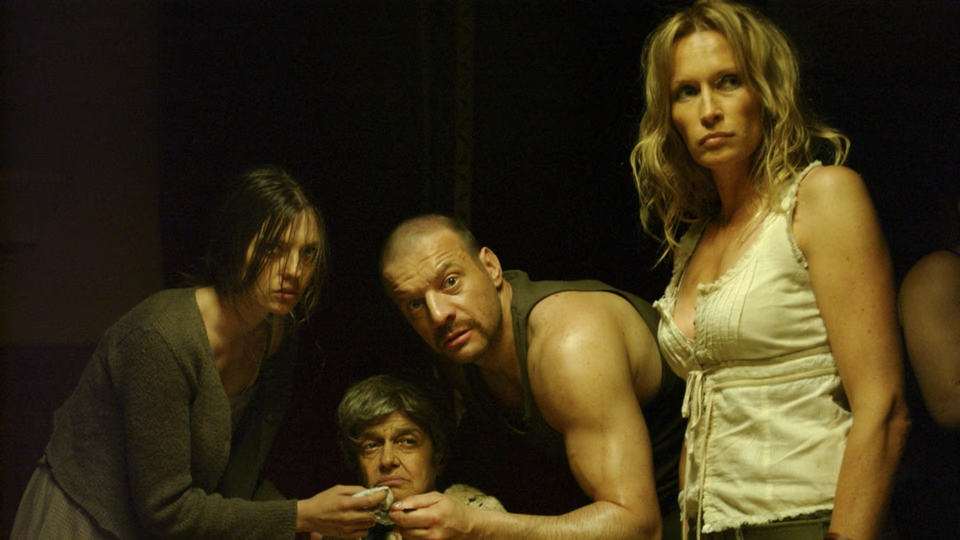Frontier(s)

Tobe Hooper knew when to quit.
Frontier(s) invites comparisons to Hooper’s The Texas Chain Saw Massacre, but writer-director Xavier Gens fumbles the pacing. Spoilers follow.
The story opens in Paris. Rioters run rampant following a conservative candidate’s election victory. Gens uses tight shots with handheld cameras to convey the chaos and urgency.
Five young-adult French Muslims—Yasmine (who’s hiding a pregnancy), her brother Sami, hot-head Alex (Yasmine’s former lover), impetuous Tom, and meek Farid—have seized the opportunity to commit a robbery.
Sami suffers a gunshot wound during the escape, prompting the group to split. Tom and Farid flee the city with the cash, while Yasmine and Alex drop Sami at a hospital.
They plan to rendezvous in the countryside, but the rural inn they choose as a meeting place harbours nasty surprises.
Following this novel setup, we’re in familiar territory. Young people chance upon the wrong house and find themselves offed in brutal fashion by a deranged extended family. The twist is that the family are white supremacists headed by an aging Nazi.
As a contemporary update to Hooper’s premise transplanted to rural France, it works. Gens leverages some of the same formal techniques Hooper employed, including early tight shots of the protagonists contrasted with wide shots of the desolate landscape to convey a sense of isolation.
Like Hooper, Gens shows a deft touch for atmosphere, crafting scenes set in a claustrophobic mine where the darkness feels heavier than lead, and a muddy pig barn where you can almost smell the manure.
But consider the aforementioned mine sequence. It climaxes with Tom and Farid squirming through a tunnel so small they’re forced to wiggle like worms. Ahead, they see a circle of light and rush toward it, aware something is closing behind them. As Tom crests the opening, a hammer swings down and bludgeons him.
Besides a loose allegory for birth, the scene serves as a visual reversal of an iconic scene in Hooper’s film, wherein a protagonist moves from the bright exterior into the darkened house only to encounter sudden, brutal violence.
But Hooper’s protagonist hesitates. He’s not fleeing an unseen assailant, just wary of the strange house. This allows the tension to build, as Hooper cuts between the house’s ominous interior and the sunlit doorway.
Hooper gives the scene time to breathe as his protagonist considers his options. Then, once he’s lingered long enough for us to feel comfortable, Hooper has his protagonist advance, and the ensuing violence hits the audience like a punch in the gut.
By this point in Gens’ film, Tom and Farid already know their lives are in danger and must keep moving. The hammer blow proves less shocking because Gens has primed us to expect violence.
Throughout, Gens tries to compensate by being more graphic. Besides the hammer blow, we see tendons severed, a man boiled alive, another bisected by a table saw, and another bled like livestock. These scenes convince. Such explicit violence exceeds anything in Hooper’s film, but Gens’ fumbled pacing undermines much of its impact.
Gens even builds to familiar climax, with Yasmine forced to endure a “family dinner.” But rather than emulate Hooper and end his film here, Gens tacks on an additional act wherein Yasmine takes out the entire family.
Not a Thriller-style revenge. Yasmine is a shell-shocked mess, head tittering and covered in blood.
Instead, Gens proffers scene after scene of Yasmine enduring brutal beatings before some contrived plotting saves her. Her lack of agency robs us of visceral thrill in rooting for her, and the repetitive violence only numbs us, rendering this final act a slog.
This added violence also begs the question: what is Gens saying? Is the added violence a commentary on the earlier riots in Paris? On news reports, we hear the victorious candidate promising to crack down on crime. Are the literal Nazis meant to compare or contrast the political right? I’m not sure, but I’ll assume the less reductive interpretation and consider it a warning that we haven’t exterminated such horrors, just driven them to the fringes.
But this interpretation carries its own set of problems, as the youngsters open the film having committed armed robbery, yet when the situation turns grave, they react like children, wanting to go home. Is Gens chastising his characters for their immaturity or empathising with their plight as disenfranchised French Muslims? Again, I’m not sure, but I struggled to achieve any emotional connection with the characters.
And what about the pregnancy? Is it symbolic or just a cheap way to heighten the violence? The Nazi patriarch wants Yasmine to join his “family” to bear more children, as one of their other abductees has only birthed deformed offspring they treat as monsters. He mutters about her blood not being “pure,” but that proves the extent of the social commentary.
Indeed, the film hints at sociopolitical metaphor throughout, but cannot deliver a resonant thesis. As an exploitation picture, better to ditch these angles and streamline the narrative.
So what to make of Frontier(s)?
The first three acts prove passable, but the lack of pacing and extraneous final act rob the story of its visceral impact. Gens’ directorial touches serve the story, but said story hints at depths it may not possess.
Fans of the New French Extremity wave of films should enjoy the craftsmanship, nihilistic attitude, and explicit violence, but those looking for a resonance akin to Martyrs or The Texas Chain Saw Massacre won’t find it here.